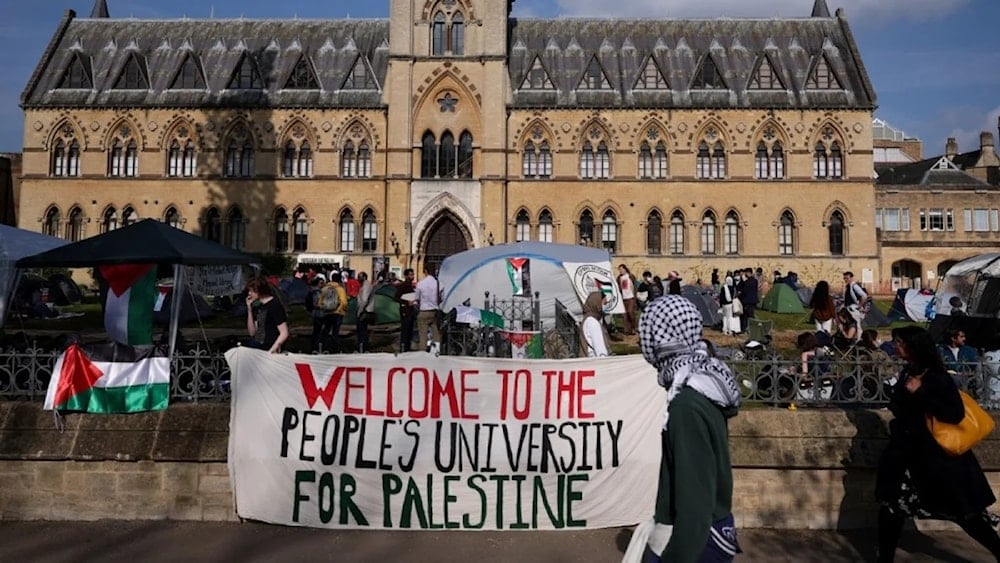‘Israel’ faces growing academic isolation even after ceasefire in Gaza
A new report warns that growing academic boycotts threaten to isolate Israeli universities, with over 1,000 European institutions cutting ties and research funding plummeting.
-

A passerby walks past a banner reading “Welcome to the people’s university for Palestine” at Oxford University on 7 May 2024 (AFP)
A recent Israeli report has highlighted a sharp increase in academic boycotts targeting Israeli researchers and institutions, a trend that has continued even after the ceasefire in Gaza took effect.
Compiled by the Academic Boycott of Israel Monitoring Team, established by Tel Aviv’s Committee of University Presidents, the report states that "Israel’s" negative image in Europe is “so deeply entrenched that political moves alone are not enough to shift public perception.”
Published by The Marker, the economic arm of Haaretz, the study notes that the ceasefire did not reduce boycott activity. On the contrary, “the opposite occurred,” with a rise in cases initiated by both institutions and individual academics.
Risks to Israeli academia
The monitoring team warned that growing academic boycotts could push "Israel’s" higher education system into “dangerous isolation that poses a real strategic threat to its international standing.”
In mid-September, Prime Minister Benjamin Netanyahu acknowledged the country’s international isolation for the first time, noting that "Israel" must prepare for a more self-reliant economy.
The report states that by November, 1,000 European universities had imposed full academic boycotts on Israeli institutions. It also documented new instances of European scholars refusing to collaborate with Israeli colleagues or universities.
Additionally, 2025 saw a reduction in EU Horizon Europe research grants awarded to Israeli academics, the primary source of scientific research funding, largely because Israeli scholars were excluded from international cooperative projects seeking Horizon funding.
Distribution and forms of boycott
According to the report, 57% of academic boycott cases target individual Israeli researchers, frequently resulting in their exclusion from international research groups. Institutional boycotts between European and Israeli universities account for 22% of cases, while 7% are driven by professional associations. Additionally, 14% of the cases involve the suspension of international programs, including student exchanges and postdoctoral collaborations, highlighting the broad scope and impact of the academic boycott movement.
The report concluded that the boycott movement “will accompany Israeli academia for a long time and will not ease without major regional and geopolitical changes.”
Since October 2023, the Israeli genocide in Gaza has reportedly killed nearly 70,000 people, primarily women and children, and injured over 170,900, leaving much of the enclave in ruins over the course of the two-year war.
Read next: Universities cut ties with Israeli academia over war on Gaza

 3 Min Read
3 Min Read









